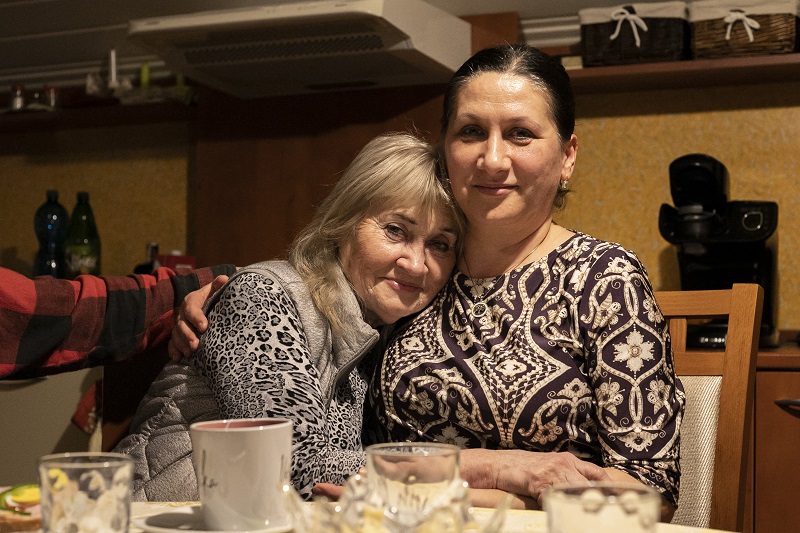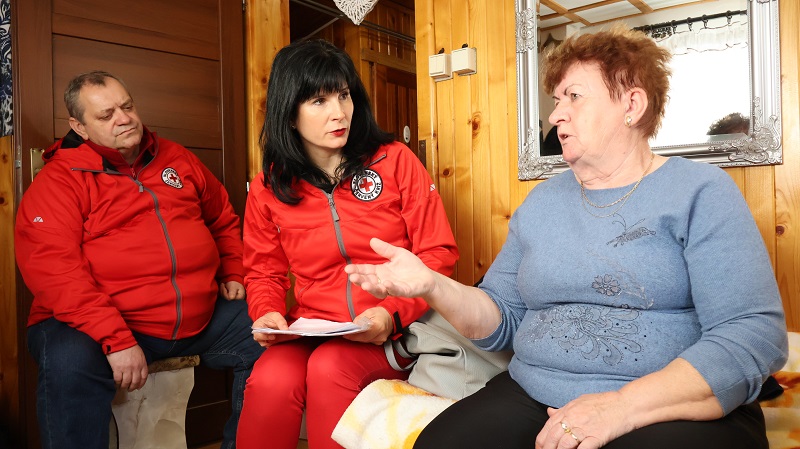Inclusion starts with accommodation
"Everything starts with accommodation. We heard that all the time from the people we support. Unless they know where they are going to stay, they can't focus on anything else like enrolling kids in school, finding a job, and so on."
As a social worker from the Slovak Red Cross shared with us, having stable accommodation is the first step to (re)build your life. However, to be able to start again in a new place, guidance and support beyond accommodation is paramount.
In September 2022, the Slovak Red Cross joined the wave of solidarity towards the growing numbers of people displaced from their homes by the Russia-Ukraine international armed conflict. Almost six million people moved to Europe, of which nearly five million were registered for protection.
The temporary accommodation solutions of EU Member States could not respond to this demand alone. Thousands of people stepped up and opened their homes or offered vacant properties to welcome displaced individuals and families, expanding the range of options through private hosting. This collective mobilisation was especially active between February and summer 2022, when countless citizen-led solidarity initiatives emerged, including help in finding accommodation.
Several Red Cross societies across the EU became engaged in the private hosting space. It was the case of the Slovak Red Cross that, with support of the International Federation of Red Cross and Red Crescent Societies (IFRC), started providing housing assistance to people displaced from Ukraine in September 2022. From February 2023 to April 2024, this work was strengthened by the support of the European Union in context of the Safe Homes project.
The Slovak Red Cross shelter programme had two variants: host family assistance and rental assistance. Based on an assessment of applicants’ economic and social situation, the Slovak Red Cross provided financial assistance for six months, with the possibility of a 3-month extension for some groups. In exceptional cases, the assistance lasted up to 12 months. Between October 2022 and April 2024, the Slovak Red Cross provided support to 241 host families and offered rental assistance to 391 displaced families.

Hosting families did much more than providing accommodation, they played a key role as a bridge to the local community and a more informal guide to Slovak systems. However, for this to work, the Red Cross put in place a dedicated team of social workers who worked with the guests to navigate the various systems of education, social welfare, health and employment. "The host feels trust if they know there are committed people behind. Our regular contact with hosts helped to prevent difficult situations," said a case worker.
Following a holistic approach that offered services beyond shelter, each guest was supported in developing an individual plan to rebuild their life in the local community, considering their needs, intentions, expectations, skills and aspirations, with short and long-term commitments. These plans involved different aspects, such as looking for employment, accessing healthcare, and navigating administrative systems. Tools were also provided to foster independence and people’s ability to find a house after exiting the programme.

The programme was designed in a way that also responded to the needs of members of the host community who were experiencing vulnerability. The Ukraine-Russia conflict has had an impact on many Slovak nationals because of the high inflation rates and rising energy prices. The Slovak Red Cross supported these families by providing rental assistance. Finally, social workers played an active role in mediating any conflicts and guiding families in accessing other available services, such as health equipment rentals or transport service.
This project shows how access to rights and services such as education, healthcare, work, social services and freedom of movement, makes people’s inclusion in their new communities easier. Hence, strengthening the integration and inclusion of newcomers must be a cornerstone of public policies and resource allocation, while recognising that people have different circumstances and needs. These positive lessons from the response to support people from Ukraine should be applied to other displacement situations, serving as a guide for building integration and inclusion policies, and funding should be ringfenced to support newcomers, regardless of where they come from.
Basic information
Activity name
Safe Homes
Country
Slovakia
Duration
September 2022 – April 2024
Partners
Slovak Red Cross and IFRC

